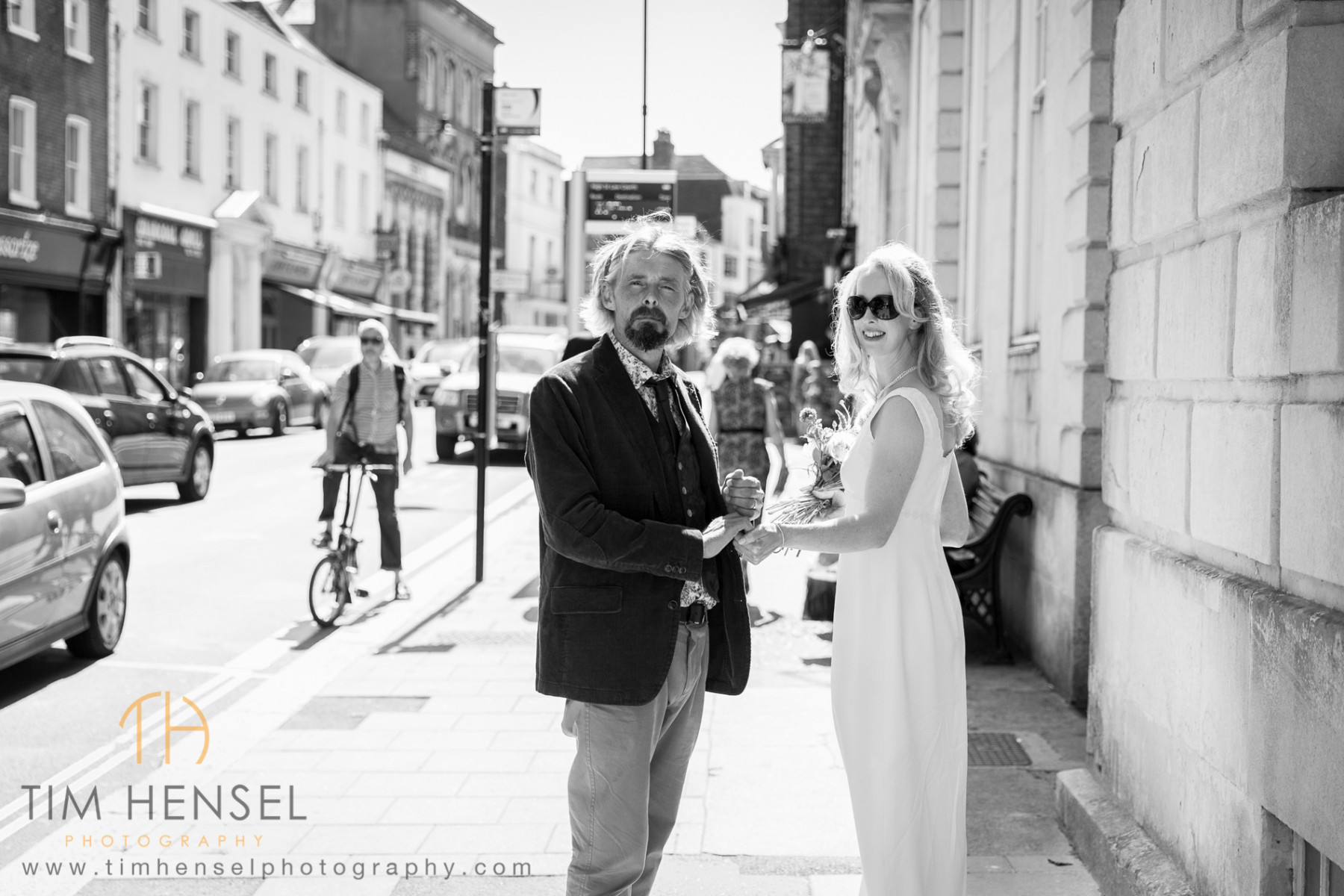
Wedding photography is, of course, a subject I know much about. It would have been very easy to write a self-serving guide telling you to book me, but that doesn’t seem fair.
Instead, here are a few notes (well, something of an essay really, but definitely not a rant) about to how to choose a wedding photographer who’s right for you.
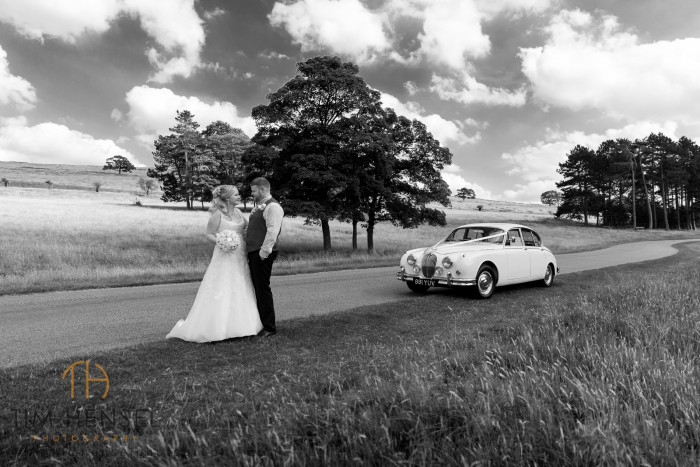
I love this shot from Amy & Dan’s wedding, taken at Lyme Park in Disley, Cheshire.
Although I could be accused of a little bias when writing a guide on choosing a wedding photographer, it’s still true that there is a lot to consider. I’m not necessarily suggesting that you should choose me (although of course I hope you’re considering it) but there’s a lot more to it than just who’s your Auntie’s friend, cheapest or happens to be closest to you.
You need to make sure you get on well with them, some are miserable gits. Of the people you hire to make your wedding happen, on the day you’re going to spend more time with the photographer than anyone.
Can they take great photographs in all situations? Will they be able to cover the range of styles necessary to properly capture your wedding? Are they insured? What if their camera breaks? Will they be nice to your Auntie?
Is photography their full-time occupation? There are, of course, some talented photographers who also hold down a “normal†job Monday to Friday, and I’m not trying to say they’d necessarily make a bad fist of it. However, I don’t believe they can offer the same commitment, level of service (before and after the wedding) and passion as someone who has dedicated their life to photography, and relies upon it to make their living.
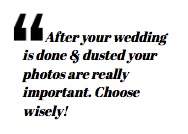
When considering how to choose a wedding photographer, you should certainly ask your potential suitors to show you some whole weddings or completed albums, not just a Greatest Hits slideshow or book. Anyone can put their best 10 or 20 pictures on a website and say “Look at me, I’m a professionalâ€, but can they capture the whole day in such a way that you’ll love to look back at it for years to come?
That brings me neatly a point that some brides don’t pick up on until they see their finished photos. Once the dust has settled and you’ve returned from your honeymoon, your photographs essentially are your wedding. Your wedding becomes a set of memories, lovely ones but memories nonetheless. Your photographs (and possibly your wedding video, most of what I’ve said here could equally be applied to videographers too) are the most important tangible thing you have left of your wedding day. So, choose wisely.
Wedding Photography Style
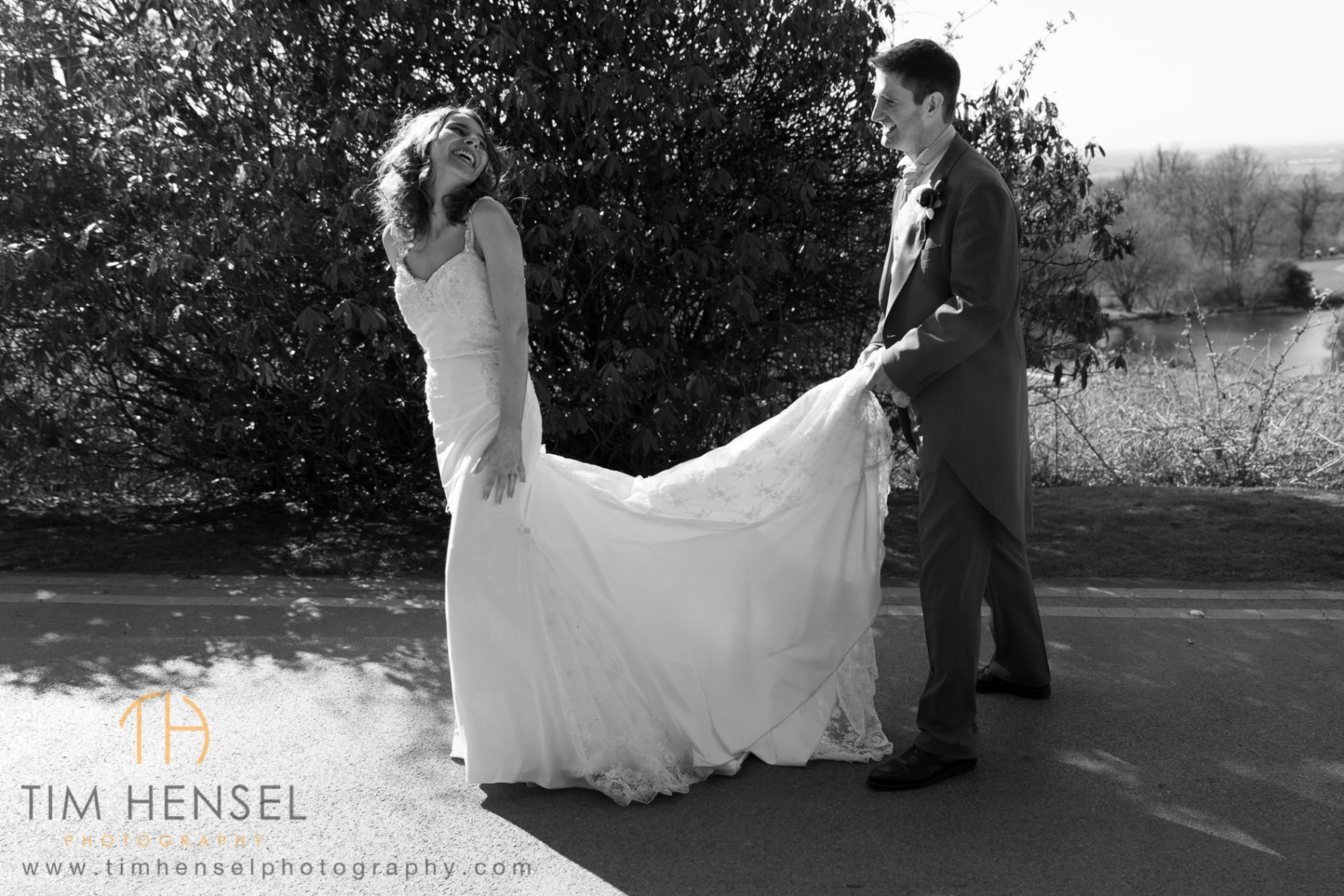 Words like Reportage, Photojournalism and Documentary are often bandied about by photographers mostly because they sound nice and arty and professional. What they all really mean is that they’ll take lovely natural photographs of the people at your wedding as the day unfolds, and in doing so tell the story of the day. People laughing or crying, kids mucking about, little moments that occur not only between you and your new spouse but the rest of the guests too.
Words like Reportage, Photojournalism and Documentary are often bandied about by photographers mostly because they sound nice and arty and professional. What they all really mean is that they’ll take lovely natural photographs of the people at your wedding as the day unfolds, and in doing so tell the story of the day. People laughing or crying, kids mucking about, little moments that occur not only between you and your new spouse but the rest of the guests too.
Family Groups
Most people, I find, also want some nice family group photos, even if it’s just a few. It should be up to you of course, but it’s a normal part of the day and your photographer should plan in advance for it.
Where will they be done? What if it’s really sunny and everyone is squinting and your white dress is reflective? What if it’s raining? What if it’s dark? With all that in place, the photographer then has to be assertive enough to arrange everyone properly while still remaining polite. All important points a good photographer should be able to take in their stride.
Bridal Portraiture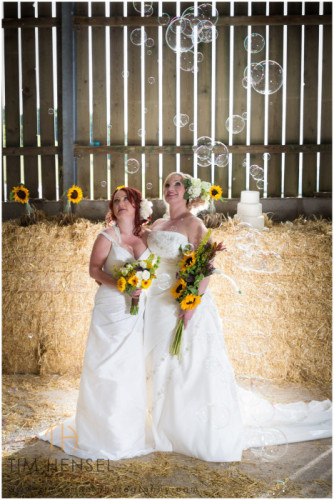
It’s also pretty much a given that most people are going to want some beautiful portraits of themselves as husband and wife (or husband and husband, or wife and wife, we mustn’t be assumptive here). You’ve planned everything to a tee, selected the finest dress, suit, shoes and a stunning location so you’re going to want some photographs that capture that.
A decent photographer ought to be able to find the perfect spot, background and so on to produce something wonderful for you. They also have to know how to light it to best effect, using natural light as available at the time as well as a combination of one or more artificial lights, usually a flashgun or two.
You have to question someone who says “I’m more of a natural light photographer” – it might just mean they haven’t mastered the art of lighting properly. Likewise, if anyone says “I just leave it on auto, it’s a really good cameraâ€, you should run for the hills.
It’s likely that you’ve put a good deal of effort into the details of your day as well the decorations, favours, centrepieces, even the seating plan. All those little details should be recorded in the photographs too.
 So, really, an excellent wedding photographer has to display a wide range of skills, not just be a great reportage guy. Make sure the photographer you choose is going to be able to cover everything you’d like them to, brilliantly.
So, really, an excellent wedding photographer has to display a wide range of skills, not just be a great reportage guy. Make sure the photographer you choose is going to be able to cover everything you’d like them to, brilliantly.
Do they know the venue?
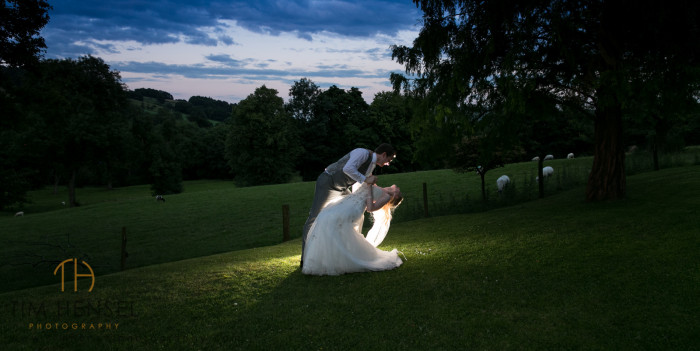
A low light shot taken at Losehill House in Derbyshire
You might well be recommended a photographer by your venue this is well and good, indeed there are those fine establishments that are kind enough to recommend me to brides (Losehill House in the Peak District is one of my favourites).
However it’s not the be-all-and-end-all - a proper photographer ought to be able to get the best out of a venue regardless of whether they’ve been there before. Personally, if a bride books me for a new-to-me venue I go there a few days before the wedding to scope it out and plan where I might do certain photos, particularly the group photos and an idea of where the best views for their portraits are. This isn’t always possible particularly with destination weddings or ones at the other end of the country but it does make me more comfortable on the day.
Essentially, a decent photographer ought to be able to react to their surroundings and work accordingly to bring out the best.
Equipment
I mentioned backup equipment (and insurance – need that too!). As it’s worthwhile to do so, I’ll mention it again. Complex technical things do go wrong sometimes, and accidents can happen. It’s best to be prepared, as it would be no good if the photographer had to leave early having dropped his camera in the fountain.
Although I’m not one to dwell on gear and so on too much, one point I will make is that really good quality lenses will give a sharpness to the images, and a lovely blur to the out-of-focus areas that simply can’t be replicated by cheap ones.
Do you get on well?
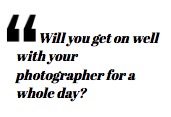 Amongst the most important points of all is this: how well do you get on with your photographer? They’re going to be hanging around with you for much of your wedding day, so if you feel a clash of personalities, or they’re too pushy, or you just plain don’t like them (there are a lot of misery-guts photographers out there) they might not be right for you, even if they’re technically brilliant and tick all the other boxes. If you don’t feel comfortable, you’re not going to look relaxed and natural in your photos, and you’re not going to enjoy your day to the full.
Amongst the most important points of all is this: how well do you get on with your photographer? They’re going to be hanging around with you for much of your wedding day, so if you feel a clash of personalities, or they’re too pushy, or you just plain don’t like them (there are a lot of misery-guts photographers out there) they might not be right for you, even if they’re technically brilliant and tick all the other boxes. If you don’t feel comfortable, you’re not going to look relaxed and natural in your photos, and you’re not going to enjoy your day to the full.
Price

I love the buzz of a city centre wedding
Finally, the thorny issue of price. I know I’m bound to say this, but when budgeting your wedding serious consideration should be given to photography. It can be a difficult thing to pin down for the bride-to-be, at there are loads of photographers around (as I’m sure you’ve noticed) with prices ranging from very little to an awful lot. However it’s not something that can be decided on price alone.
Choose the best wedding photographer you can within your budget, and choose one whose work you really like. That’s much more important that who’s offering the best deal this week or the biggest album or such like. Good photographs will always be good photographs, and mediocre ones just that, even if they’re in a really posh album.
What you should really be paying for is your photographer’s skill and experience, and above all their “eyeâ€. If their images connect with you, if you love their work, then they’re probably worth what they’re charging.
While it might look like it from the outside, the price of a wedding photography package isn’t plucked out of the air, it is (or should be anyway) carefully worked out by the photographer. A really good, professional photographer, should expect to be paid more than a less experienced one, a less talented one, a jack-of-all-trades or someone who only does it at weekends.
I should also mention that it’s worth checking the price quoted is what you’ll pay. Photographers can be notorious for adding things on afterwards, for example they might limit the number of photos they’ll give you to a couple of hundred then charge per picture after that. Or, there might be exorbitant charges for more pictures or pages in your album.
That’s all folks!
You’ll forgive me, I’m sure, for assigning a post to this subject – it’s close to my heart as well as being my livelihood. I’ve tried to be fair and balanced, and not simply jump up and down going “pick me, pick me”.
Let me ask you something though – how many other photographers have you come across who’ve dedicated the time to producing a guide like this ebook? I hope that goes some way to showing how committed I am to wedding photography.
If you haven’t got your copy yet, go over and get one! It’s completely free, and I wrote it in conjunction with a professional wedding planner. A version of this very article appears in the book, along with a number of other subjects you might think about when planning your wedding.
Thanks for looking.
Tim
Please share this post!
Use the icons on the left to share this post with anyone who you think might find it helpful!
I’d love to have your comments and thoughts on how to choose a wedding photographer too, whether you’re a bride who chose a great photographer or felt you chose the wrong one, or if you’re a photographer yourself. Please add your comments below, and don’t forget to tick the “also post on Facebook” box 🙂
Thanks!
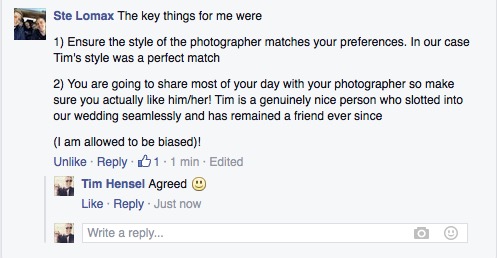
Related article:Â budgeting for wedding photographyÂ
Get your free stress free wedding planning guide
Joelle
What a lovely and informative article Tim – I reckon it will really help some brides to be choose the right wedding photographer!
timhensel
Thank you Joelle 🙂